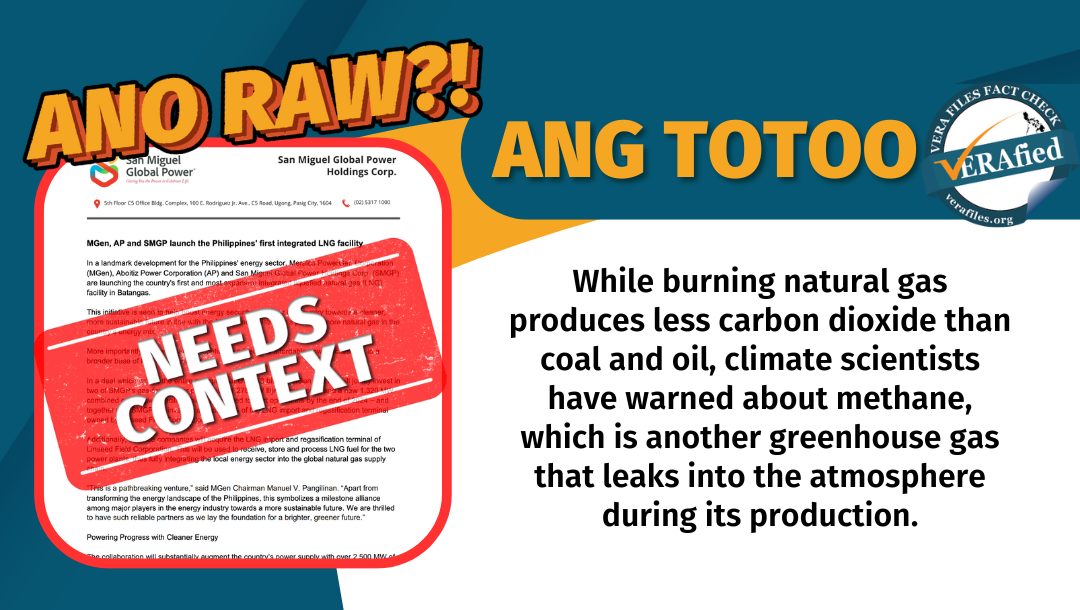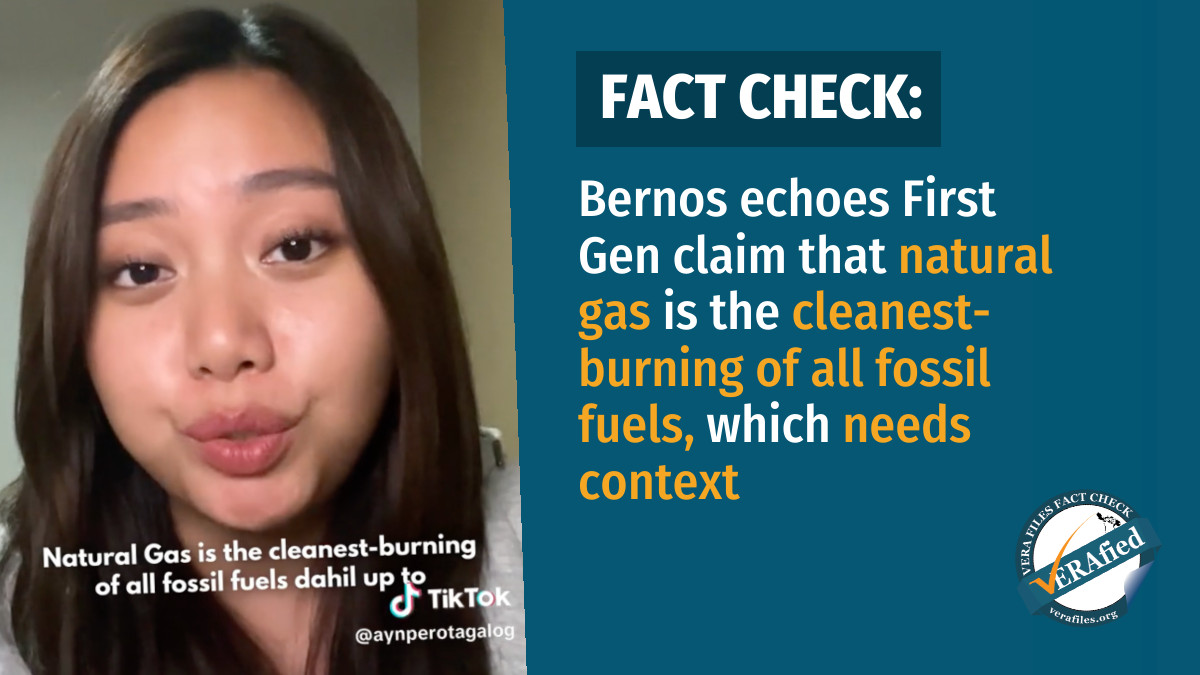Press releases of two power companies on March 4 announced a deal for a large-scale integrated liquefied natural gas (LNG) facility in Batangas, emphasizing the “environmental advantages” of the fossil fuel. This needs context.
STATEMENT
Meralco PowerGen Corp., Aboitiz Power Corp. and San Miguel Global Power Corp. have signed a US$3.3-billion agreement to invest in two gas-fired power plants and acquire the LNG import and regasification terminal of Linseed Field Corp.
Separate but similar press releases from the partners said their collaboration aims to meet the country’s energy needs and contribute to its environmental goals “by significantly lowering emissions.”
They said:
“LNG offers significant environmental advantages over traditional fossil fuels contributing to reduced greenhouse gas emissions, combating climate change, improving air quality and enhancing public health, making it the ideal transition fuel to a renewable energy future.”
Sources: Aboitiz Power and San Miguel Global Power, MGen, AP and SMGP launch the Philippines’ first integrated LNG facility, March 4, 2024
FACT
While burning natural gas produces less carbon dioxide (CO2) than coal and oil, climate scientists have warned about methane, which is another greenhouse gas that leaks into the atmosphere during its production.
Greenhouse gases trap heat in the atmosphere that could affect the climate and weather patterns of the Earth. For decades, the level of CO2 in the atmosphere has consistently increased at alarming levels, causing temperatures to rise.
The United Nations Environment Programme (UNEP) places the warming effect of methane at “80 times greater than that of CO2” over a 20-year period.

Mark Radka, head of the UNEP Energy and Climate Branch, explained that factors such as the characteristics of the fuel, the combustion technology and how well equipment is maintained and operated affect how much more conventional air pollutants are produced from natural gas.
Radka pointed out that recent scientific measurement campaigns “have shown that methane emissions from oil and gas operations are much higher than was estimated earlier.”
One of the long-term goals for nations under the Paris Agreement is reducing global greenhouse gas emissions to limit global temperature increase to 1.5 degrees Celsius. The Agreement is a legally binding international treaty on climate change, which the Philippines ratified in March 2017.
BACKSTORY
The Philippine government is pushing the implementation of LNG projects “to increase the shares of cleaner energy sources” in the energy mix.
Data from the Department of Energy show that as of 2020, more than half of the country’s power comes from coal. Renewable energy and natural gas sources contributed 21% and 19%, respectively.
Have you seen any dubious claims, photos, memes, or online posts that you want us to verify? Fill out this reader request form.
Sources
Reuters, Cleaner but not clean – Why scientists say natural gas won’t avert climate disaster, Aug. 18, 2020
National Geographic, Natural gas is a much ‘dirtier’ energy source, carbon-wise, than we thought, Feb. 20, 2020
Philippine Center for Investigative Journalism, Liquefied natural gas: a dirty, costly detour, March 11, 2023
United States Environmental Protection Agency, Greenhouse Gases, Accessed March 7, 2024
United Nations Environment Programme, How do greenhouse gases actually warm the planet?, Jan. 5, 2022
NASA.gov, What is the greenhouse effect?., Accessed March 7, 2024
National Geographic, Greenhouse gases, facts and information, May 13, 2019
BusinessWorld, LNG terminals seen to pose threat to PHL energy security, Feb. 20, 2023
United Nations Environment Programme, Is natural gas really the bridge fuel the world needs?, Jan. 12, 2023
United Nations Environment Programme, Facts about Methane, Accessed March 6, 2024
United Nations, The Paris Agreement
United Nations, Treaty Collection
Department of Energy, Philippine Energy Plan 2022 – 2040, Accessed March 6, 2024
Department of Energy, Natural Gas Development Plan, Accessed March 6, 2024
(Guided by the code of principles of the International Fact-Checking Network at Poynter, VERA Files tracks the false claims, flip-flops, misleading statements of public officials and figures, and debunks them with factual evidence. Find out more about this initiative and our methodology.)


